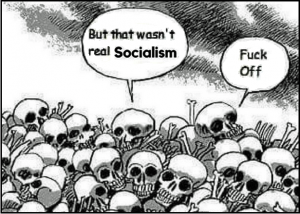
Geoffrey M. Hodgson
When it was used by Robert Owen and his followers from the 1830s, the word socialism meant “the abolition of private property” and the adoption of widespread common ownership. That same meaning was accepted by Karl Marx and Frederick Engels. It was used in the twentieth century to describe Marxist regimes in Russia, China, Cuba and elsewhere. The goal of widespread common ownership was inscribed in the aims and values of the UK Labour Party from 1918 to 1995.
The socialist algorithm has eight steps, arranged in a loop:
Step 1: Critique. Point to all the dreadful things that have happened under capitalism, including war, famine, oppression, exploitation, economic inequality and environmental degradation.
Step 2: Dream. Propose a non-existent, imaginary socialism that is highly democratic, peaceful, egalitarian and non-discriminatory. Say that it includes widespread state ownership but avoid going into details on how a large-scale complex system would work, or about the institutional and administrative mechanisms involved, or how ultra-democracy would operate in practice.
Step 3: Ignore. Discount claims by leading economists, political scientists and historians that such a system could not work fairly and humanely, at least unless major roles were retained within the system for markets and private property. Press on regardless to the next step.
Step 4: Solidarise. Choose some regimes in the past that started on the socialist road, such as Russia, China or Cuba. If a new explicitly socialist regime – Venezuela for example – pops up and carries out some policies you like, such as reducing poverty and illiteracy, then give it your support for a while.
Step 5: Blame. When things go wrong with the nominated socialist regimes in Step 4 – including war, famine, oppression, exploitation, economic inequality or environmental degradation – blame foreign intervention, sanctions by capitalist countries or internal counter-revolutionaries. Don’t blame the issues ignored in Step 3.
Step 6: Deny. When it proves difficult to blame everything that goes wrong on foreign intervention, sanctions by capitalist countries or internal counter-revolutionaries, then deny the scale or even the existence of the problems.
Step 7: Rename. At the point where the socialist regimes nominated in Step 4 become so dreadful – with war, famine, oppression, exploitation, economic inequality or environmental degradation – to the point where blame or denial (Steps 5 and 6) are no longer plausible, then declare that these regimes were not, or are no longer, socialist.
Step 8: Return. Collect £200 and go back to Step 1.
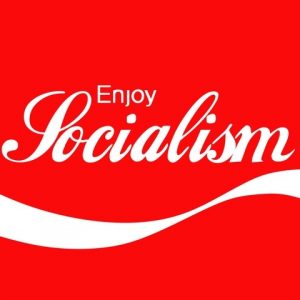
This algorithm has variant criteria, particularly over those used to decide what regimes are described as socialist under Step 4. This leads to endless controversies among socialists over the criteria and outcomes of such choices.
The personal determination to deny facts in Step 6 may also waver among some less-hardened comrades.
Further controversy exists among socialists on the criteria deployed in step 7, which trigger the abandonment of the socialist label in particular cases.
The Russian Revolution
The Russian Revolution instigated the socialist algorithm and led to countless runs of the program. It has also illustrated numerous variants.
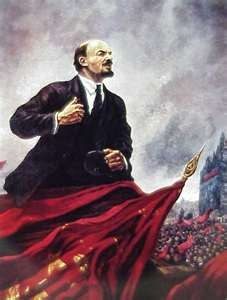 Some say that it never was “proper socialism” in the first place, for some reason, such as the failure to establish worker control of the factories, or the dissolution of democratic government. These purists move rapidly to Step 7, collect their £200, and move back to Step 1.
Some say that it never was “proper socialism” in the first place, for some reason, such as the failure to establish worker control of the factories, or the dissolution of democratic government. These purists move rapidly to Step 7, collect their £200, and move back to Step 1.
Bertrand Russell quickly collected his £200. He visited Russia in 1920 in a Labour Party delegation, where among others he met Lenin. Russell wrote in 1924: “Socialism … means the common ownership of land and capital, together with a democratic form of government.”
Hence, for him, Bolshevik Russia was never socialist. But Russell did not consider the possibility that any concentration of ownership and economic power in the hands of the state would always undermine political democracy. (Step 3.)
Or you may say that the Bolshevik regime was socialist up to the restoration of some private ownership and markets with the New Economic Policy in 1921. Or you could say that socialism ended in Russia with Stalin’s consolidation of power in 1928. Die-hard forgivers of Stalinism would say that it ended in 1991.
To survive, the die-hards need a good dose of denial (Step 6). For example, in 1990 Corbyn’s future aide Seumas Milne suggested that estimates of deaths under Stalin by Robert Conquest and others were too high. This was quickly contradicted when more evidence became available in 1991 showing that earlier estimates, particularly by Conquest, were in the right ball park.
Socialist Scrabble
Imagine the consternation and debate caused in Marxist circles over these problems. The neatest solution is to avoid any proclamation of socialism and describe all Soviet-style regimes as “state capitalist”. This is the ingenious solution of Tony Cliff and others. Cliff was the founder of what eventually became the Socialist Workers Party.
The trouble with this solution is that the definition of capitalism becomes so flattened and widened that it bears less resemblance to Marx’s analysis in Capital. This disparity becomes more severe when the importance for capitalism of financial markets is taken into account, as highlighted by Joseph Schumpeter and others. Competitive financial markets played no more than a marginal role in Russia from 1917 to 1991.
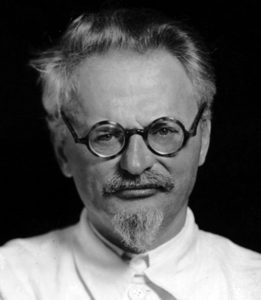
Leon Trotsky
Leon Trotsky was more subtle. He introduced the concept of “degenerated workers state”. This term signalled that the working class had gained power, but the system had become corrupted by an over-bearing bureaucracy. For Trotsky, Soviet Russia was neither capitalist nor socialist.
But true to his Marxist credentials, Trotsky had to argue that a system where a rising class was neither in nor out of power had to be unstable – it could only last a few years.
Trotsky was murdered in 1940, so he left that problem to his followers. This unstable “transitional” regime lasted for well over half a century, defying Trotsky’s analysis.
And so it goes on. There are numerous variants, and many moves on the socialist scrabble board – playing with labels or names.
Socialist Venezuela
The drama in Venezuela is playing out before us. Many – but not all – socialists hailed the election of the radical socialist Hugo Chávez in 1998.
In 2004 a number of intellectuals and politicians signed a “manifesto” declaring that they would vote for Chávez if they were Venezuelans. The signatories included Tariq Ali, Perry Anderson, Tony Benn, George Galloway, Eric Hobsbawm, Ken Livingstone, Naomi Klein, Ken Loach, John Pilger and Harold Pinter.
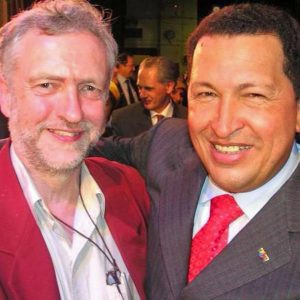
Jeremy Corbyn and Hugo Chávez
As late as 2015, when Venezuela was in ever-deepening crisis and human rights violations were abundant, Corbyn’s enthusiasm for the regime was undiminished. He remarked:
Blame then rename
As the problems with the regime of Chávez grew in intensity, Step 5 (Blame) came into force. There may have been involvement by the CIA, particularly in the brief coup that overthrew Chávez for a few days in 2002. But hostilities from outside were relatively mild, particularly compared with Civil War that followed the Bolshevik Revolution in 1917. Venezuela continues to sell oil to the US and several other countries. Venezuela buys arms and military equipment from the UK, as well as from Russia and China.
Neither external nor internal opposition can adequately explain the unfolding catastrophe in Venezuela. In fact, the problems started at the beginning. Chávez manipulated electoral mandates to undermine democratic checks and balances, to increase executive power, to neuter the Supreme Court, to make criticism of his government illegal and to increase censorship.
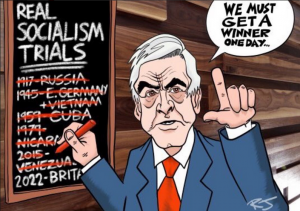
The outcome after 2013 was the disastrous regime of Nicolás Maduro. Venezuela saw famine, oppression, exploitation, economic inequality and environmental degradation.
By 2018 there was hyper-inflation of around a million per cent per annum, and about three million Venezuelans – about 10 per cent of the population – had emigrated.
Despite his 2014 declaration of support quoted above, John McDonnell has now moved to Step 7, helped by a little more denial on the way. On 20 May 2018 he declared “I don’t think it [Venezuela] was a socialist country”. McDonnell has collected his £200 and returned to Step 1.
Conclusion: back to the beginning
Obviously, it all starts with Step 1. Let us pause here for a while. There is a lot wrong with capitalism. But let us distinguish between capitalist democracies and autocracies.
Democracy is a key variable. The Biblical Four Horsemen of the Apocalypse are conflict, war, famine and death. As I have outlined in my book Wrong Turnings, from historical experience the antidote is clear: the chances of war, famine and premature death can be greatly diminished through a society with democratic institutions that defends +universal human rights.
Many of the horrors of capitalism occurred under undemocratic regimes. Wars between democracies are relatively rare. Famines are much less common under capitalist democracies. Consequently, the reduction of death and misery from famine and war is best pursued by opposition to all forms of despotism, whether capitalist or Communist.
This does not mean that capitalist democracies are always peaceful and unoppressive. Far from it. What it means is that there is plentiful evidence that democracy reduces the chances of famine, environmental degradation, premature death and war. And, for explicable reasons, no socialist country has lasted as a democracy.
Dreaming (Step 2) is fine. But we have to practical and realistic. Rather than ignoring in Step 3, we need to understand. One of the major problems with socialism – at least in its statist and non-market versions – is that a concentration of economic power in the hands of the state leads unavoidably to a dangerous and undemocratic concentration of political power.
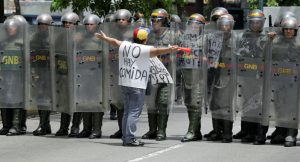
“There’s no food”
In the Venezuelan case, the concentration of political power, which was designed to achieve statist control of the economy, had adverse effects well before wholesale public ownership was achieved.
Either way, attempts to move toward socialism weaken the economic sources of countervailing power and undermine the socio-economic foundations of democracy. Despite pronouncements to the contrary, the centralizing mission of statist socialism always leads to the destruction of necessary checks and balances.
In history there has been no exception to this outcome. We may dream of socialist democracy, but in the end we must learn from history and from analysts who show the dangers or impracticalities of socialist solutions to the problems in the world. In short, statist socialism cannot co-exist with democracy and with the protection of human rights.
25 August 2018
Minor edits – 26 August 2018.
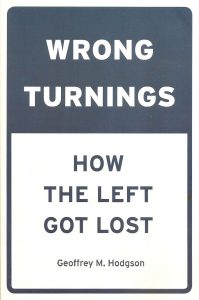
Bibliography
Cliff, Tony (1955) Stalinist Russia: A Marxist Analysis (London: Michael Kidron).
Conquest, Robert (1968) The Great Terror (London: Macmillan).
Conquest, Robert (1986) The Harvest of Sorrow: Soviet Collectivization and the Terror-Famine (Oxford: Oxford University Press).
Griffiths, Dan (ed.) (1924) What is Socialism? A Symposium (London, Richards).
Schumpeter, Joseph A. (1942) Capitalism, Socialism and Democracy (London: George Allen and Unwin).
Trotsky, Leon D. (1937) The Revolution Betrayed: What is the Soviet Union and Where is it Going? (London: Faber and Faber).


 Some say that it never was “proper socialism” in the first place, for some reason, such as the failure to establish worker control of the factories, or the dissolution of democratic government. These purists move rapidly to Step 7, collect their £200, and move back to Step 1.
Some say that it never was “proper socialism” in the first place, for some reason, such as the failure to establish worker control of the factories, or the dissolution of democratic government. These purists move rapidly to Step 7, collect their £200, and move back to Step 1.




Good blog! I must get your latest book! I remain a Socialist and live in a perpetual state of hope!
Thanks Geoff. For 30+ years I have been a social democrat, but not a socialist. I hope that you enjoy my Wrong Turnings book.